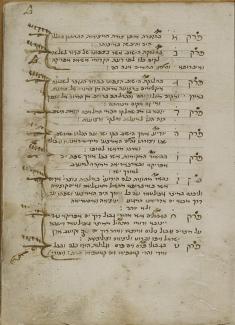Event

2019-2020 Schoenberg Institute for Manuscript Studies & the Herbert D. Katz Center Distinguished Fellow's Lecture in Jewish Manuscript Studies:
"Changing Minds: Geographic Discoveries and New Worlds through the Eyes of a Renaissance Jewish Scholar"
Professor Fabrizio Lelli, University of Salento (Lecce, Italy)
Professor Lelli will introduce the fascinating manuscript of Abraham Abraham ben Mordecai Farissol's 16th century geographical treatise, Iggeret orhot ʻolam (LJS 499; 1524) the first modern Hebrew work on geography with a special interest in the Jewish dispersion, and also the first Hebrew writing that mentions the New World.
Toward the end of his relatively long life, the Provencal-born Jewish scholar Abraham ben Mordekhai Farissol (c. 1451–1525/26) wrote in Ferrara a Hebrew work titled Iggeret orhot ‘olam (A letter-treatise on the paths of the world). In it, the author, an authentic Renaissance polymath, wanted to cast light on the changing horizons of his contemporary world. Traditional frontiers had suddenly opened up, thanks to the recent Portuguese, Italian, and Spanish discoveries of previously unknown remote lands. Jewish scholars, and especially those who happened to live in the most thriving cultural centers of the Italian peninsula, were deeply concerned with any field of knowledge that aroused the interest of their non-Jewish colleagues. A few decades before Farissol, another "universal scholar," Yohanan Alemanno (c. 1435–c. 1506), who experienced—like Farissol—the vibrant atmosphere of Lorenzo de' Medici's Florence and of Ercole I of Este's Ferrara, had similarly praised the Portuguese discoveries in Africa and India. For both Alemanno and Farissol, such an interest in the quest for the unknown corners of the earth did not have a merely political or commercial connotation. Jewish scholars tried to match the new geographic knowledge of their age with their own biblical and post-biblical traditions, in order to demonstrate that the newly found lands were still inhabited by the descendants of the "lost Jewish tribes." Moreover, geographic discoveries allowed them to locate more precisely the Garden of Eden, or the Sambatyon River. However, if Farissol followed in the footsteps of his predecessors when dealing with the lost tribes and their reappearance in Africa or India, he certainly was the first Jewish author who described the New World extensively. For this reason, the Hebrew Ms. LJS 499, that contains Farissol's Hebrew work, is not only significant for its contents and for the close relation of its scribe with the Provencal author, it also constitutes the only witness of the very few codices extant of the Iggeret orhot ‘olam that is housed today in a public collection of the New World. Reservations for this lecture are requested.
Fabrizio Lelli is Associate Professor of Hebrew Language and Literature at the University of Salento (Lecce, Italy). His research focuses mainly on the philosophical and mystical literature of late Medieval and Early Modern Italian Jewish authors and on the intellectual relations between Jewish and Christian scholars in the Italian Renaissance.
This lecture is sponsored by the Jewish Studies Program at the University of Pennsylvania.
https://www.library.upenn.edu/about/exhibits-events/changing-minds
